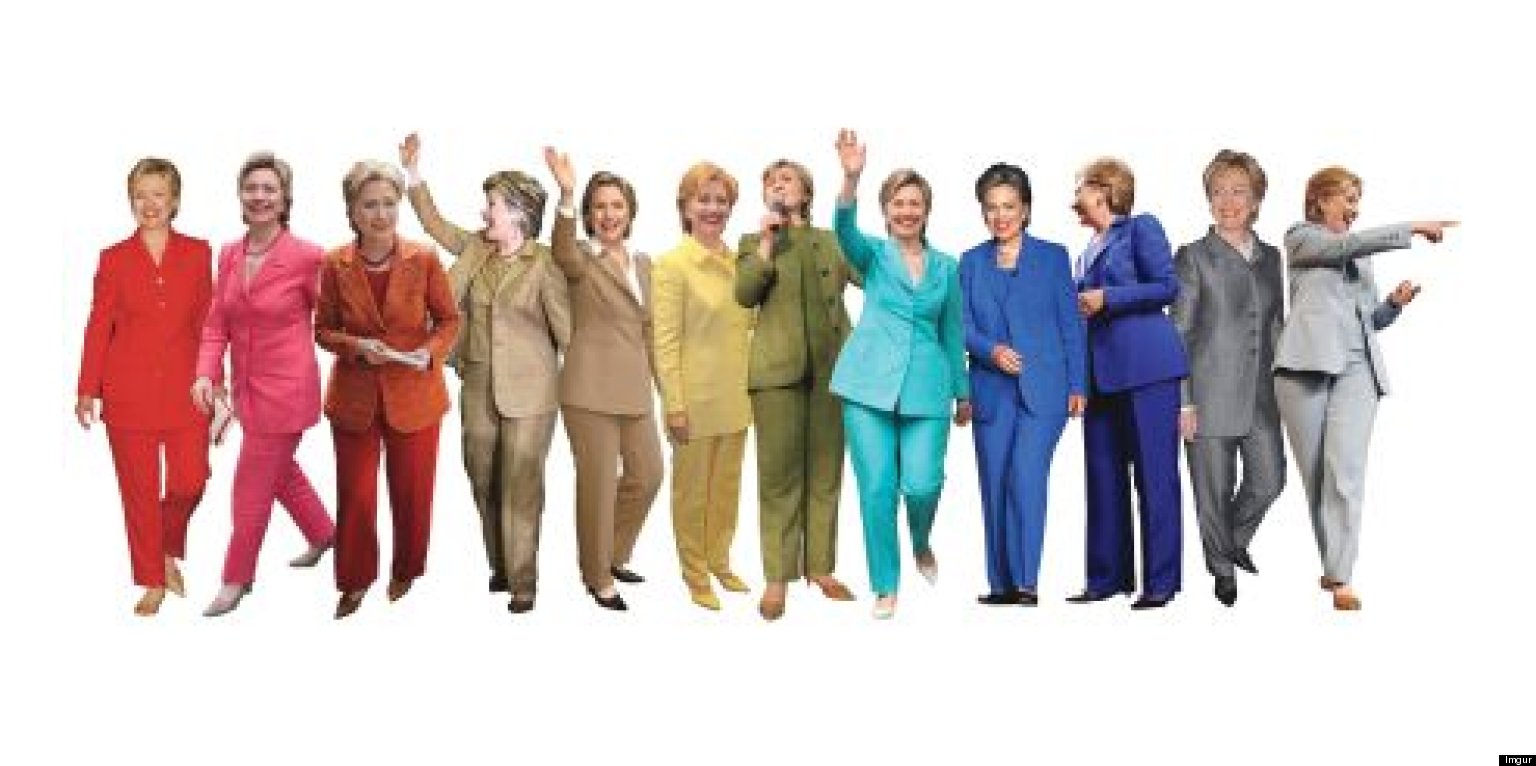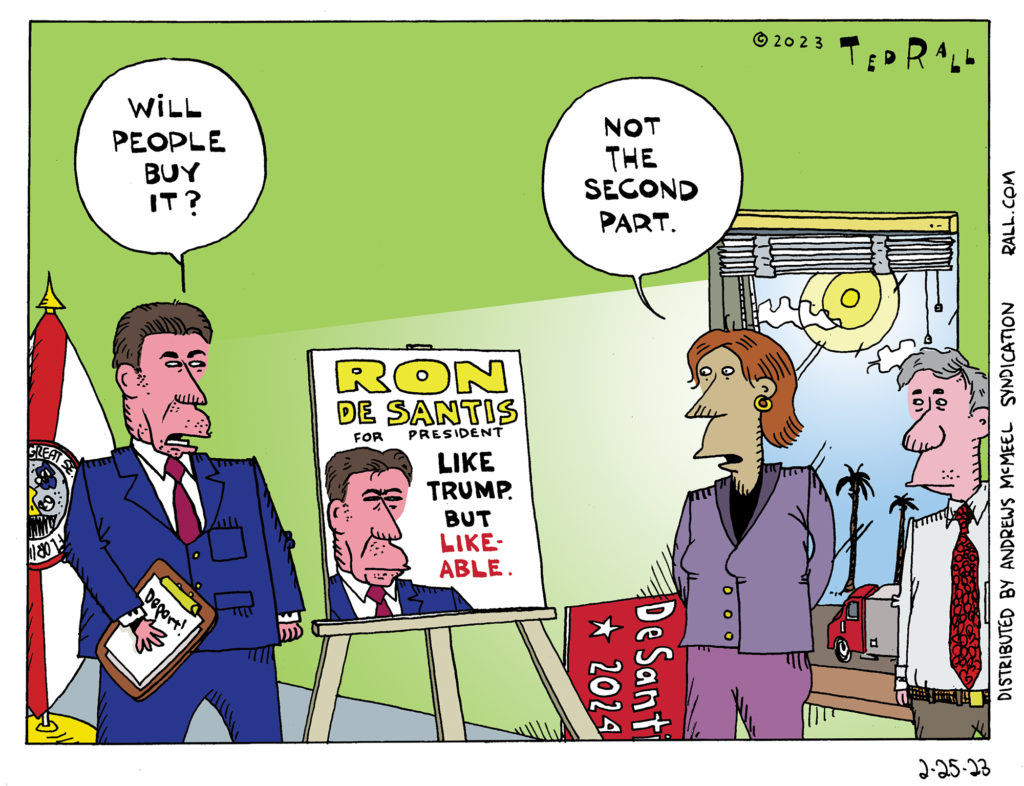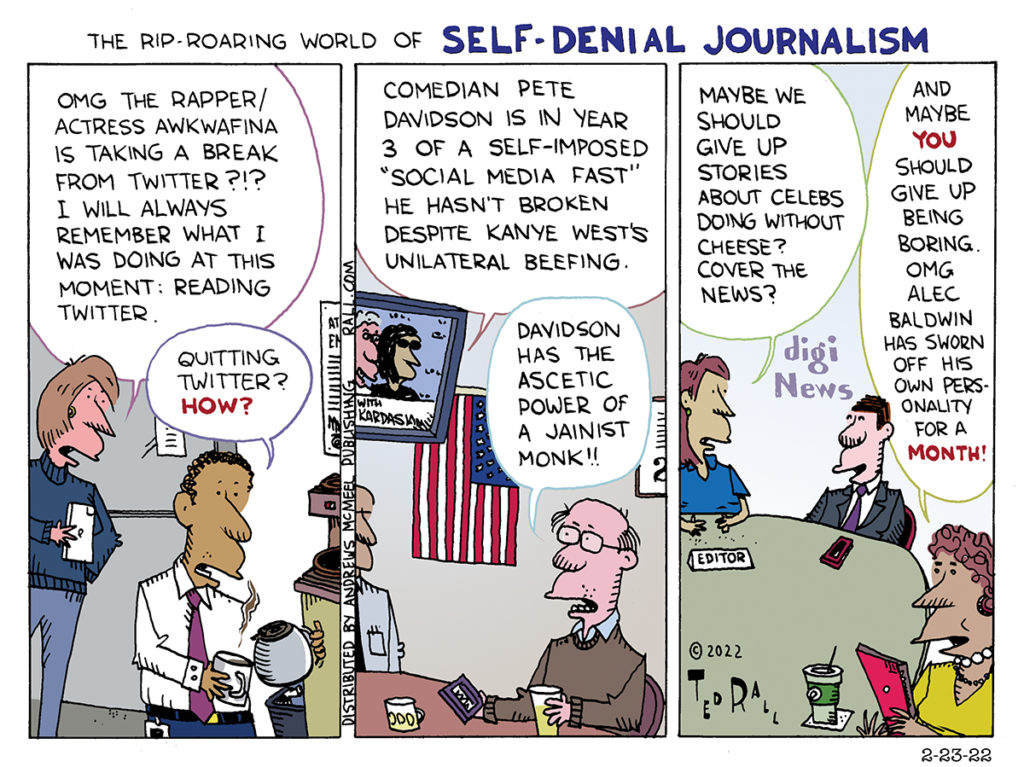Florida Governor Ron DeSantis is considered the most formidable challenger to Donald Trump for the Republican presidential nomination. But he’s extremely unpleasant. How does he scale beyond Florida in elections where personality really count?
SYNDICATED COLUMN: Goofus Hillary vs. Gallant Hillary

I’m calling bullshit on Hillary.
Not on Hillary herself. On the media’s portrayal of her.
“The private Hillary is as warm and charming a woman as anyone could conjure up. The public Hillary sometimes seems brittle, with the judgment of a raging rhinoceros,” writes fellow syndicated columnist Ann McFeatters.
I don’t mean to pick on McFeatters. Everyone (in the media) says the same thing: Hillary Clinton is so awesome one-on-one or maybe one-on-six, in private. For example, Mark Leibovich says she’s “quite human and funny” in private.
She’s been a high-profile national politician for more than 20 years. Why hasn’t she figured out how to charm the American public on TV?
These repeated accounts of Hillarity are less than reliable, issued as they are by the kind of people in a position to have met Hillary Clinton, which pretty much guarantees that they’re boring and bland and not very smart — the kind of people who think Obama means well and that Jon Stewart is a laff riot.
But let’s say it’s true. Who will we be voting for or against next year — Public Goofus Hillary or Private Gallant Hillary?
If you evaluate presidential candidates based on how much fun they’d be to share a drink or six with, Hillary presents a trust dilemma. Who wants to throw back cold ones with greedy tone-deaf Public Hillary, worth $20 million if she’s worth a dime, as she whines that she’s not “truly well off“?
But what if it’s true that Private Hillary rolls salt-of-the-earth style, wickedly funny and cool? Should you take a leap of faith, taking the word of the same press corps that gave us the Iraq War, and support the real — albeit secret and seen by few — Hillary?
Perhaps you’re one of those voters who views the presidency as a role to fill, and presidential elections as a casting call. For you, the POTUS is America’s representative on the world stage. He or she has to look — and feel — presidential. Your ideal prez would exude FDR’s charisma, wear Reagan’s suits, have Obama’s calm and JFK’s (or Mitt Romney’s) hair.
For you image voters too, Private vs. Public Hillaries are a problem.
Public Hillary is a nonstarter. She embodies the George W. Bush school of bull-in-a-China-shop diplomacy: the last thing we need is another war, one caused by her deployment of the same nasty exasperated expression she wore at the press conference where she tried to talk away her destruction of four years of electronic archives of the foreign policy history of the United States.
On the other hand, Loveable Private Hillary could bond with Vladmir Putin and other troublesome world leaders, banging out peace treaties and favorable trade agreements at karaoke bars from Pyongyang to Moscow. But what if Private Hillary is as much of a chimera as Saddam’s WMDs? Public Hillary Who Is Also Private Hillary could piss off so many old enemies, and make so many new ones, that we’d be fending off ICBMs in no time.
Or maybe you’re like me, an issues voter. As long as he or she supports the right policies and fight against the bad ones, you don’t care if a politician drinks, or womanizes, or drinks and drives a woman to the bottom of a pond. Show me the bills, dammit!
If you’re in it for substance over style, the Tale of Two Hillaries is even more difficult to tease out.
New York Times columnist Maureen Dowd calls Hillary a “feminist icon wallowing in regressive Middle Eastern states’ payola.” I’ll focus on the “feminist icon” part: what, aside from being a woman, has Hillary Clinton done for women? She has never proposed a significant piece of women’s rights legislation. Her 2008 presidential bid marketed her, not as a woman, but as a Margaret Thatcher-style “Iron Lady,” a man in woman’s clothing. Only now, echoing Obama’s double-win on the strength of historical symbolism, is she planning to emphasize the plight of girls and women in a patriarchal society.
On policy, Public and Private Hillary blend together. Not because she’s integrated. Because she’s a mess of contradictions: a liberal who supports wars of choice, obsessed with her own privacy as she runs interference for the NSA.
Even if Gallant is the real Hillary, and all that Goofus stuff is either her cynical attempt to work the system in a man’s world or reflects a personality unable to connect with people in large groups, I can’t vote for her.
She supports war and drones and the NSA. Who cares if she’s a barrel of laughs behind closed doors? So was Stalin.
Anyway, my invitation to hang out with her appears to have gotten lost in the mail.
(Ted Rall, syndicated writer and the cartoonist for The Los Angeles Times, is the author of the new critically-acclaimed book “After We Kill You, We Will Welcome You Back As Honored Guests: Unembedded in Afghanistan.” Subscribe to Ted Rall at Beacon.)
COPYRIGHT 2015 TED RALL, DISTRIBUTED BY CREATORS.COM
SYNDICATED COLUMN: Presidential Politics: All Personality, No Platform
Distributed by Creators Syndicate (click the link to purchase for publication):

Hillary Clinton has everything she needs to run for president: money, name recognition, staff, organization. Everything except ideas.
The 2016 presidential campaign will begin in earnest in late summer. This hasn’t snuck up on her; she has known this was coming since at least 2008. Yet here she is, six months before the unofficial start of her run, starting to figure out what she’ll do if she wins.
“People close to Mrs. Clinton say she has not yet settled on a specific platform” on the economy, the New York Times notes in a report about a recent series of meetings she held with 200 economists in order to collect their assessments of the economy.
There’s nothing wrong with asking experts for suggestions about how to fix the problems you want to solve. But you should already have a vision for what America and its economy ought to look like. You should be born with your platform – and, if you decide to run, collect advice from your brain trust on a granular level, concerning how to realize your goals.
If you haven’t always known what you would do if you woke up tomorrow morning as president, and whom you would appoint to help you govern, you have no business running.
Unfortunately, the former senator’s lack of ideas isn’t unique. She reflects a disturbing shift in American politics that most people haven’t noticed because it snuck up on us over time: in the past, politicians ran on a slate of ideas. Now they campaign as personalities.
Look at political buttons from a century ago. FDR ran on “prosperity” and “jobs.” They’re vague — but they’re ideas. And when he won, FDR demanded that his ideas become laws within his first 100 days. Reagan declared that it was “morning in America.” What does that mean? It’s been 35 years, he served two terms, I still don’t know. “Yes we can,” Obama promised in 2008. Can what? It worked because your mind fills in the rest, but it says nothing. “Hope.” “Change.” For/to what?
Reading the diaries of Chief of Staff HR Haldeman, I was surprised to learn that the newly-elected Nixon administration – led by this reputedly hardheaded ideological warrior – spent much of its first year, 1969, recuperating from the campaign it had just won, learning how to use the White House phone system and how to liaise with Capitol Hill before finally sitting down to determine what it actually wanted to do domestically and vis-à-vis foreign policy. I realized that, at least dating back to the 1960 race between Nixon and JFK, presidential candidates haven’t gone into it with much of a vision of how they want to change America. Their primary goal is to get the job, to add the gig to their resume, satisfied that their face may someday end up on a stamp or maybe a coin, and that schoolchildren will forever have to memorize their names.
Think back to the first year of every presidency in recent memory. None, even those like Reagan and George W. Bush who eventually oversaw radical policy changes, pushed major legislation right out of the gate – which is surprising given that a president will never have as much political capital as when he first takes the office. Stepping in during the middle of a global economic crisis, Obama never proposed anything on the economic front and handed off his Affordable Care Act to congressional Democrats throughout his first year. Since 2009 Obama has come off like a guy who achieved everything he wanted simply by having been elected. Bush’s first year was derided as aimless and policy-free until 9/11 gave him a sense of purpose. No major policy prescriptions came out of the Clinton White House for much of his first term.
2016 is once again shaping up as a clash of personalities over ideas, a high school student council-style personal popularity contest – “who would you most rather have a beer with?” (or, in Clinton’s case, are you “likeable enough“?) – as opposed to a debate over the direction of the country. Writing in the Washington Examiner, Michael Barron asks: “Can Jeb Bush — or anyone — come up with a platform for primaries, general, and presidency?”
Implicit in this question is the curious fact that none of the likely contenders for the Republican presidential nomination have yet articulated a platform. Even the most ideologically grounded GOP candidate, Rand Paul, finds himself showcased in a New York Times profile as drifting to the so-called “center” of his party – i.e., away from libertarianism. Isn’t it a little late in the game to be drifting?
Instead of dealing with ideas Paul, who made headlines for filibustering against Obama’s drone strikes and aggressively criticizing NSA spying, is said to be facing “questions about his style and temperament.” Never mind what he wants to do. This is about style: “Does someone who can be so impetuous and unapologetic have the finesse and discipline to win over people who are more naturally inclined to vote for someone else?” asks the Times.
They say we get the candidates and the presidents we deserve, but that’s not true. The system is broken, and has been for a long time. What else can you say about politics that isn’t about politics, but primarily if not exclusively about personality?
We may or may not deserve it, but we need better.
(Ted Rall, syndicated writer and cartoonist for The Los Angeles Times, is the author of the new critically-acclaimed book “After We Kill You, We Will Welcome You Back As Honored Guests: Unembedded in Afghanistan.” Subscribe to Ted Rall at Beacon.)
COPYRIGHT 2015 TED RALL, DISTRIBUTED BY CREATORS.COM


